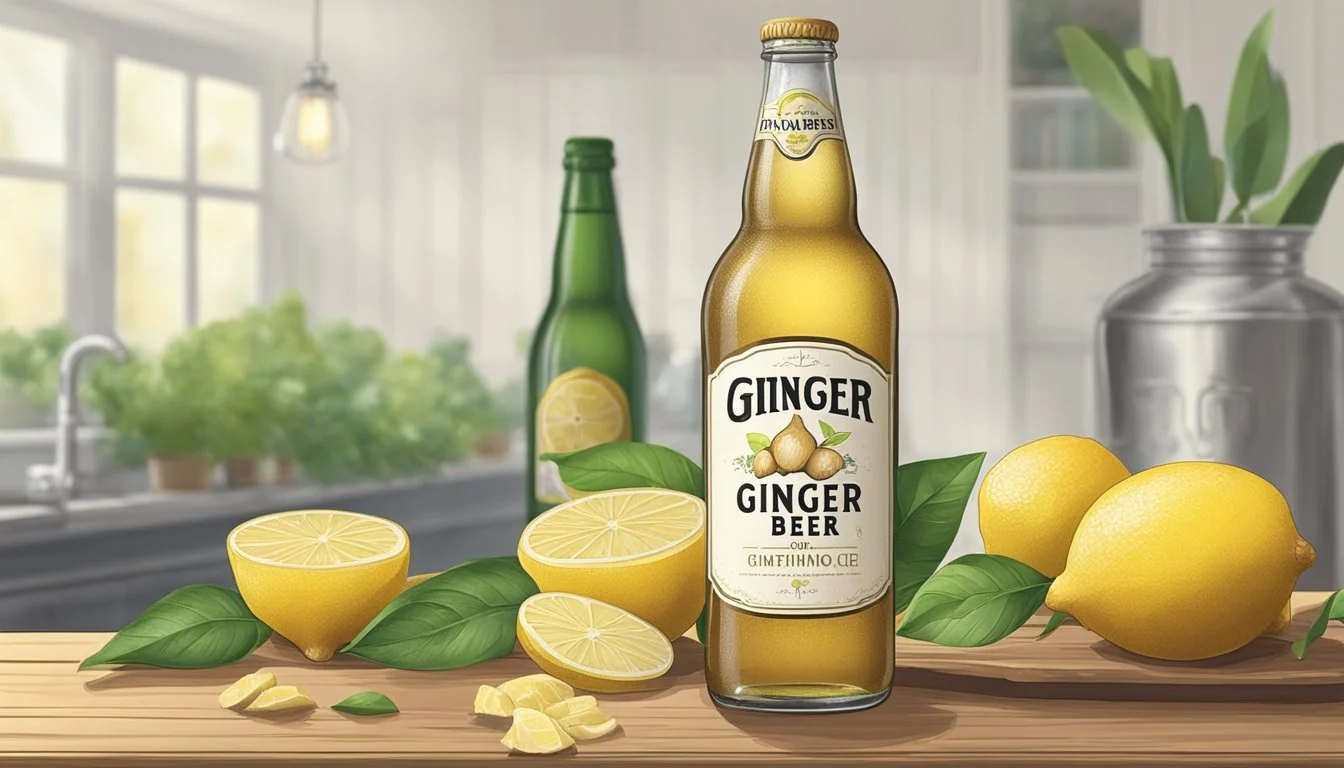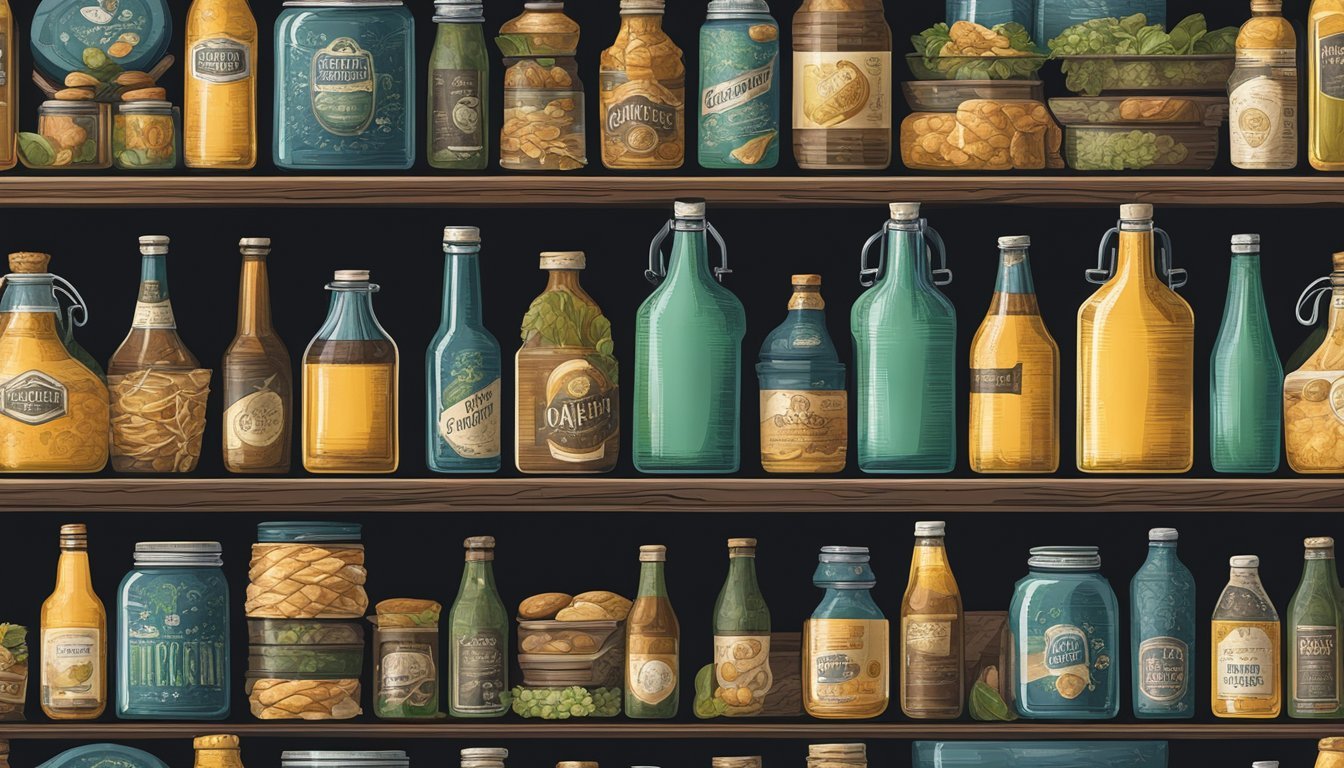Does Ginger Beer Expire?
Essential Shelf Life Facts
Ginger beer, with its tangy taste and fizzy nature, is a popular beverage enjoyed by many. Yes, ginger beer does expire, and its longevity depends on storage conditions and whether it is opened or unopened. Properly stored unopened ginger beer can last up to 18 months, whereas opened bottles should ideally be consumed within a few weeks.
Many people wonder about the best ways to store ginger beer to maximize its freshness. Keeping an unopened bottle in a cool, dark place helps preserve its flavor for several months. Once opened, the quality diminishes quickly, so it's advisable to drink it within a week or two.
Understanding these factors not only helps in enjoying ginger beer at its best but also ensures safety and optimal flavor. Stay tuned to learn more on how to identify expired ginger beer and tips for storage.
Understanding Ginger Beer
Ginger beer is a carbonated beverage known for its spicy and robust flavors, often enjoyed both as a standalone drink and as a mixer in cocktails. It can be alcoholic or non-alcoholic, depending on the fermentation process and ingredients used.
Origins and Composition
Ginger beer has its origins in the United Kingdom in the 18th century. Initially, it was brewed using natural fermentation of ginger, sugar, and water. Traditional recipes often included a small amount of lemon juice or cream of tartar to balance the flavors and aid in fermentation.
Today's ginger beer comprises several key ingredients:
Ginger root for flavor
Sugar for sweetness and fermentation
Water as the base
Yeast for fermentation
Some brands also include additional herbs and spices to enhance the taste. This combination provides a distinctive flavor profile that sets ginger beer apart from other ginger-flavored sodas.
Different Types of Ginger Beer
Ginger beer varies widely based on how it's produced and whether it's alcoholic. Alcoholic ginger beer undergoes a longer fermentation process to develop alcohol content, while non-alcoholic ginger beer goes through shorter fermentation or carbonation methods.
Store-bought brands offer diverse options, from mild to very spicy, catering to different taste preferences. Homemade ginger beer allows for customization of sweetness and spiciness but may have a shorter shelf life due to natural ingredients and lack of preservatives. The alcohol content in commercially available ginger beer varies, usually between 0.5% to 4%.
Health Benefits of Ginger Beer
Ginger beer can offer several health benefits, primarily due to the properties of ginger itself. Ginger is known for its anti-inflammatory effects, which may help reduce symptoms of arthritis pain.
Moderate consumption of ginger beer can aid in digestion and alleviate nausea. Additionally, ginger's natural compounds are believed to improve circulation and have antioxidant properties, which contribute to overall wellness.
When used as a mixer in cocktails, responsible consumption is key to enjoying these potential benefits without the drawbacks of excessive alcohol intake. With its unique flavor and health-promoting ingredients, ginger beer remains a popular choice among carbonated beverages.
Shelf Life of Ginger Beer
The shelf life of ginger beer varies based on factors such as storage conditions and whether the bottle is opened or unopened. Recognizing signs of expiration is also essential to ensure the quality and safety of the beverage.
Factors Affecting Shelf Life
Several factors affect the shelf life of ginger beer. Storage conditions play a significant role. Unopened ginger beer should be stored in a cool, dark place away from direct sunlight to maintain quality. Opened ginger beer should be kept in the refrigerator to prolong its freshness.
The ingredients and manufacturing process can also influence how long ginger beer lasts. Using preservatives can extend its shelf life, while natural or homemade varieties may expire quicker due to the absence of such additives.
Typical Shelf Life for Unopened and Opened Bottles
Unopened ginger beer generally has a shelf life ranging from 2 months to 9 months, depending on the brand and storage conditions. Storing it in a cool and dark place can extend this period.
Opened ginger beer has a much shorter shelf life. It is best consumed within 4 days to 2 weeks and should be kept in the refrigerator to maintain its taste and quality. Beyond this time frame, the flavor may deteriorate even if it remains safe to drink.
Signs of Expiration
Identifying signs of expiration in ginger beer is crucial to avoid consuming a product past its prime. A significant change in taste is one of the primary indicators. If the drink loses its characteristic ginger flavor or becomes overly bitter, it may have expired.
Additionally, visible changes such as cloudiness or sediment formation might suggest the ginger beer is no longer fresh. Any unusual odor can also be a warning sign. Always check the expiration date on the packaging as a reference, but use sensory cues to ensure optimal quality.
Storage and Preservation
Understanding how to store ginger beer effectively ensures its longevity and preserves its taste. Proper storage conditions, refrigeration, and best practices for maximizing shelf life are crucial.
Proper Storage Conditions for Ginger Beer
Ginger beer, whether in glass bottles or cans, should be stored in a cool, dark place to maintain its quality. Temperature fluctuations can negatively impact the flavor and carbonation, so it is wise to avoid areas that are prone to heat.
Commercially produced ginger beer often contains preservatives, which help extend its shelf life, but proper storage is still essential. Keeping it at room temperature is acceptable, provided it stays away from direct sunlight and heat sources.
Unopened packages, when stored properly, can maintain their freshness for up to 9 months.
Refrigeration and Its Effects on Quality
Refrigerating ginger beer is highly recommended. Storing it in the refrigerator slows the natural fermentation process and helps to lock in flavors. The ideal temperature range for chilling ginger beer is between 35°F (1.6°C) and 40°F (4.4°C). This range helps in preserving both the taste and carbonation.
Opening a refrigerated bottle or can drastically reduces its lifespan. Opened ginger beer should be consumed within a week or two to ensure it stays fresh and pleasant to drink. It's best to keep it sealed in the refrigerator to prevent any loss of carbonation and taste degradation.
Maximizing Ginger Beer's Shelf Life
To maximize the shelf life of ginger beer, it is critical to follow several best practices. First, always store unopened bottles or cans in a cool, dark place, away from light and heat sources. This helps in maintaining the drink's quality over time.
Once opened, always refrigerate the ginger beer in a sealed container. Glass bottles with airtight lids are particularly effective at preserving carbonation and flavor. Additionally, paying attention to the expiration dates and storage instructions on the label can provide guidance on the optimal storage conditions.
Avoid frequently opening and closing the container to prevent exposure to air and contaminants that may accelerate spoilage.
Recognizing and Handling Expired Ginger Beer
Identifying when ginger beer has expired and how to handle it is crucial for maintaining safety and quality. Paying attention to spoilage indicators, safety measures, and proper disposal methods ensures the best experience.
Identifying Signs of Spoilage
Expired ginger beer typically shows clear signs of spoilage. Carbonation loss is a primary indicator—if the drink is flat, it may be past its prime. Additionally, a cloudy appearance, unusual odor, or changes in taste suggest spoilage. Some brands of ginger beer may break down faster due to their ingredients. For homemade versions, spoilage can occur more quickly due to the absence of preservatives.
Spoilage Signs Indications Flat Carbonation Loss of bubbles Cloudy Appearance Murky or unclear liquid Unusual Odor Off or sour smell Changes in Taste Bitter or unpleasant flavor
Safety Considerations
Safety is paramount when consuming ginger beer. While it doesn't become dangerous like some foods, it's not advisable to drink expired ginger beer. Bacteria and other microorganisms may develop, leading to potential nausea or other digestive issues. Commercial brands tend to last longer, but always check the expiration date. Homemade ginger beer lacks preservatives, hence scrutinize signs of spoilage more closely.
Key Safety Tips:
Always check for unusual signs before drinking.
Store in cool, dry places to extend shelf life.
Consume homemade ginger beer within a shorter timeframe.
Disposing of Expired Beverages
Proper disposal of expired ginger beer protects safety and hygiene. Pour the outdated beverage down the drain rather than consuming it. Ensure the container is recyclable or discard it correctly if it's not. In environments where recycling water is crucial, dilute the ginger beer with water when disposing to minimize any potential stress on the drain system.
Disposal Steps:
Check the ginger beer for spoilage signs.
Pour expired ginger beer down the drain.
Recycle or discard the container responsibly.





